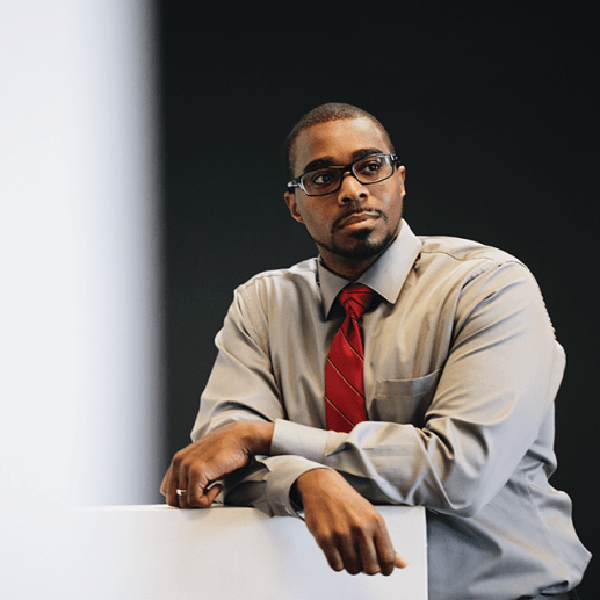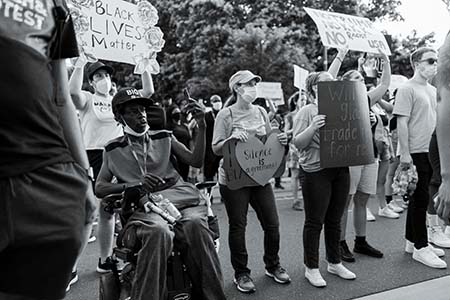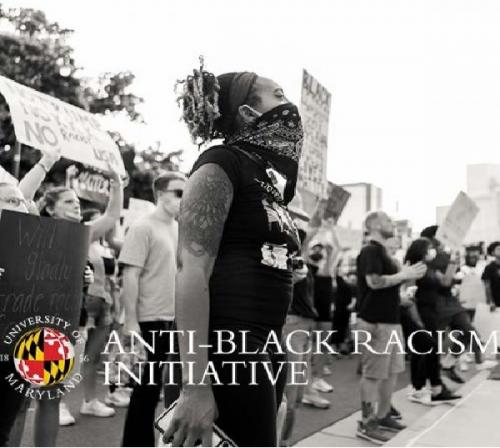It did not start with George Floyd. But his words—“I can’t breathe”—and his cries for his deceased mother while dying under the knee of a police officer are what stopped many Americans from continuing to turn a blind eye to outrageous racial injustice.
In the national consciousness, Floyd’s haunting final moments mix with names and scenes across the country—Breonna Taylor, Ahmaud Arbery, Black Lives Matter protestors confronted with greater force than the predominantly white insurgents who stormed the U.S. Capitol building, resulting in casualties. In many ways, 2020 became a turning point in awareness and acknowledgment of anti-Black racism, and of deadly inadequacies and injustices in American policing and politics.
Why? How? When will it stop? Why won’t this end? How many more? What will it take?
Questions also arose closer to home in the College of Behavioral and Social Sciences. As educators, administrators and researchers, what can we do to address anti-Black racism? How can we improve society? How can we ensure that our classrooms and our campus are safe, fair and accessible to all?

Professor Rashawn Ray in the Department of Sociology wanted answers, and action. With support from Dean Greg Ball, Ray connected with more than 40 faculty members, staff, and students across the college and the university to establish the BSOS Anti-Black Racism Initiative (ABRI).
ABRI promotes long-term change in the college and on the campus, and beyond. Grounded in the behavioral and social sciences, its mission is to elevate the status and experience of African Americans. To do so, ABRI engages in supporting scholarship, teaching, and dialogues of all types, and at all levels, to fight against anti-Black racism in our society—individual, structural, and cultural.
“Faculty in BSOS have conducted research on ways to address racism for years. The Anti-Black Racism Initiative is a way to scale up this work, address disparities and make sustainable change on our campus and in our communities,” Ray said.
Connecting the Dots, Finding the Gaps
The work started, Ray said, as a “data dump”—colleagues worked to find out what resources and programs are already available on campus, and what is missing. The college and the university already have a number of impactful resources and initiatives related to the work of ABRI. Ray tapped into those resources, and organized conversations among faculty, staff, undergraduate and graduate students, and members of the College Park community about challenges and opportunities.
Early needs and priorities emerged: additional hires of faculty members who do work in areas related to ABRI’s mission; more mentorship and development opportunities for Black faculty members; more mentorship and guidance opportunities for Black students; and seed grants and funding opportunities to support ABRI-related research and activities.
The need to address and standardize curricula and reading lists also emerged— ABRI leadership agree that it is past time to update and expand reading lists and other course materials to include diverse perspectives and ways of thought.
Ideas and solutions have also begun to emerge. There is discussion and cross-campus support for an Anti-Black Racism Minor, in collaboration with the College of Arts and Humanities (ARHU). Specifically, the Department of African American Studies in BSOS and the Department of American Studies in ARHU would play key roles in this potential offering. The ABRI leadership team is working with colleagues across campus on this effort.
Looking to the local community, Joel and Kim Feller Endowed Professor Joseph Richardson, the acting chair of the Department of African American Studies, is discussing restorative justice possibilities for the Lakeland community within College Park, which was disrupted by campus expansions.
“We are working with College Park Mayor Patrick Wojahn, with Maxine Gross of the Lakeland Community Heritage Project, with Associate Professor Mary Corbin Sies in the Department of American Studies, and other stakeholders to explore the ways the university has been involved in damage to the Lakeland community, including the destruction of 104 Black-owned homes. This is about the displacement of a community, their loss of wealth and quality of life,” Richardson said. “We are a land-grant intuition. We have a responsibility to these people. There was damage that was done.”
Ray says that promising efforts within the College Park area and within BSOS departments are already being identified and examined, with the hopes of scaling them up to greater levels. Doing so would help UMD stay current and competitive with peer institutions.
“We’ve seen that responsive, effective, immediate action can be taken to meet these needs. There are a lot of big changes happening at our peer institutions,” Ray said. “There is no reason why we need to wait to make transformative change happen here at Maryland.”
Events focused on addressing racism and related social issues have already been held by ABRI in collaboration with units including the Critical Race Initiative and the Bahá’í Chair for World Peace.
“One way that we have found ABRI to be useful already, is that it sheds light on the challenges that many of us already know we face on this campus. As a faculty member, on busy days, you’re just trying to get from Point A to Point B. This process has made addressing anti-Black racism and creating a better culture a priority, front and center,” said Associate Professor Dawn Dow of the Department of Sociology. Dow is co-chair of the ABRI’s Research and Events subcommittee, along with Professor Hoda Mahmoudi, holder of the Bahá’í Chair.
A continuing challenge, Dow noted, is that the work of ABRI must not be limited to those involved in the initiative itself, or to students and faculty already doing work in related areas.
“We want everyone to feel ownership of these issues. This is a national crisis that is happening right now,” Dow said. “There are no quick fixes. But this work can and should belong to everyone.”
Events and formal discussions are also helping faculty members from across different disciplines to find ways they can support one another and amplify related efforts.
“This work is helping us to break down the silos and bring people together. The more the ABRI communicates what’s happening in the college, the more faculty will start to connect with others, and likewise students. We help make events and opportunities visible, and the more we do so, I think people will begin to see areas where there might be more possibilities for collaboration,” Mahmoudi said.
Realities, Resources and Resolve
As assistant dean for Diversity, Equity and Inclusion, and as a researcher in the field of psychology, Dr. Kim Nickerson brings both administrative leadership and experience as a faculty member to his work in the ABRI. Nickerson co-chairs the Pedagogy Subcommittee along with Associate Professor Jessica Goldberg of the Department of Economics.
Nickerson said that, over the years, he has seen programs and initiatives start and stop, some with more success than others.
“Right now, we have the support and the enthusiasm for ABRI,” Nickerson said. “But to be honest, humans have short attention spans.”
Nickerson helps the ABRI to stay focused on what he calls the “three Rs”: Realities, Resources, and Resolve.
The realities, he said, are both lack of funding and organizational red tape. He said he hopes that resources can be allocated to meet ABRI recommendations in the near future, and that the resolve to improve the Black experience can be sustained, even as other challenges and priorities emerge.
“We can and must improve the Black experience on this campus. Through our research and our work, we also have the ability to improve the Black experience in this country,” Nickerson said. “We have some uncomfortable realities. But I believe we also have great potential, and the necessary resolve. We need support from our leadership, and we need support from our alumni. We now have a platform to concentrate that support.”
An Enduring Crisis Requires Urgent Response
 Several faculty members noted the different ways that the college and the university addressed the COVID-19 pandemic in real-time—while not responding with appropriate urgency to the life-and-death problems driven by racism.
Several faculty members noted the different ways that the college and the university addressed the COVID-19 pandemic in real-time—while not responding with appropriate urgency to the life-and-death problems driven by racism.
“We’ve been talking a lot about racial health disparities in this country as they relate to COVID. What struck me about the university’s response to the COVID pandemic was how quickly funding and resources and plans appeared. All of a sudden, there were immediate plans of action when it came to COVID operations.
There were pots of money available for seed grants supporting research related to COVID. There was a student crisis fund established,” Richardson said.
“We continue to be in a public health crisis related to racism. We have a racial epidemic of gun violence, for example. Racism is a public health threat. Where is the immediate response? Where is the funding to support research and programs that will address the health issue that is racism?”
Ray says that, in order for BSOS and the university to prove that addressing anti-Black racism and related challenges is indeed a priority for the institution, swift action must be taken, and significant investments must be made.
ABRI’s formal report will soon be published and presented to BSOS leadership for review. Ray said the report will outline many calls to immediate action, most especially funding for faculty hires and faculty development; support for the ABRI minor; and funding for ABRI events and community engagement opportunities.
“We’ve proven that there is great innovation. We now need to know that there will be great investment to move these efforts forward,” Ray said. “In the middle of a pandemic, when many of us were stretched with teaching and research and home life, we also took on the tremendous work of this project. It would be a disaster if this was just another report that sits on a shelf. Maryland has the capacity to be a national and international leader in anti-Black racism in the areas of teaching, research, mentorship, and the student experience.”
Photos by Korey Townsend/VOICEDTV. Video by Denise Cooper/Noir Elite. Article originally published on May 17, 2021.



